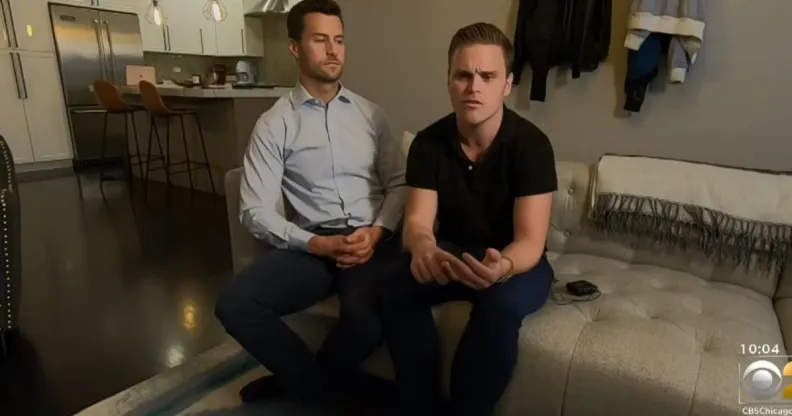Gay doctor and his boyfriend who weren’t allowed to donate COVID-19 antibodies say ‘bigotry and laziness’ to blame

Screenshot of Dillon Barron and his boyfriend (CBS Chicago)
A gay doctor who survived COVID-19 wanted to donate his plasma to help others – but his sexuality means he isn’t allowed.
Dr Dillon Barron, an emergency room doctor in Chicago, contracted the coronavirus in the course of his work and has since made a full recovery.
People who have already had COVID-19 have antibodies in their blood which it is believed could help protect them from a future infection – however, this is not yet proven.
Research is ongoing to determine whether antibody-rich blood donations from those who have had coronavirus could help protect others.
Dr Barron wanted to play his part in this effort – but his sexual orientation means that he is not allowed to contribute, he told CBS Chicago.
In the United States, gay and bisexual men must remain celibate for three months in order to donate blood, a restriction that originated in the form of a lifetime ban in the 1980s when the AIDS epidemic was at its height.
Gay doctor was ‘passionate’ about donating antibody-rich plasma after surviving COVID-19 – but he was turned away.
“I really felt passionate about doing something; wanting to be in control and feel like I was helping people,” Barron said.
“We’re sitting on something that could be saving lives,” he added.
Barron’s partner Eric Seelbach also wanted to donate his plasma when he recovered from COVID-19, but he too was turned away.
He said thousands of pints of blood “won’t be available because of bigotry or laziness, or people who don’t believe in the science”.
We’re sitting on something that could be saving lives.
Barron is not the first doctor to call out discriminatory blood donation policies in light of the coronavirus pandemic.
Earlier this month, gay doctor Joseph Heskin, who lives in the UK, shared his story on BBC Radio about how he tried to donate plasma, but was turned away.
He said the incident was “quite humiliating”.
“It was quite strange because I knew that the answer I was given was coming, because I’ve spoken to other people who have been through the same process. So I actually expected that answer and yet still it took me by surprise how upsetting it was.”
Queer men are prohibited from donating blood in various countries across the world.
Gay and bisexual men are banned from donating blood in numerous countries across the world.
Many countries introduced lifetime bans on queer male blood donors in the 1980s at the height of the AIDS epidemic.
Since then, some countries have relaxed their bans, instead opting for three month or 12 month “deferral periods” that require queer men to practice celibacy for long periods of time in order to donate blood.
In April, more than 500 doctors and experts wrote a letter to the Food and Drug Administration (FDA) in the United States urging them to scrap the “antiquated” restriction.
The open letter cited a 2014 study from the UCLA School of Law which found that lifting the ban on gay and bisexual men donating blood would see 360,000 people become eligible.
“Banning men from blood donation for at least a year since their most recent sexual encounter with a man is unscientific and based on outdated antibody-based HIV testing algorithms.
“Fortunately, we can reliably test for HIV using antigen-based assays and maintain the safety of the U.S. blood supply.”

